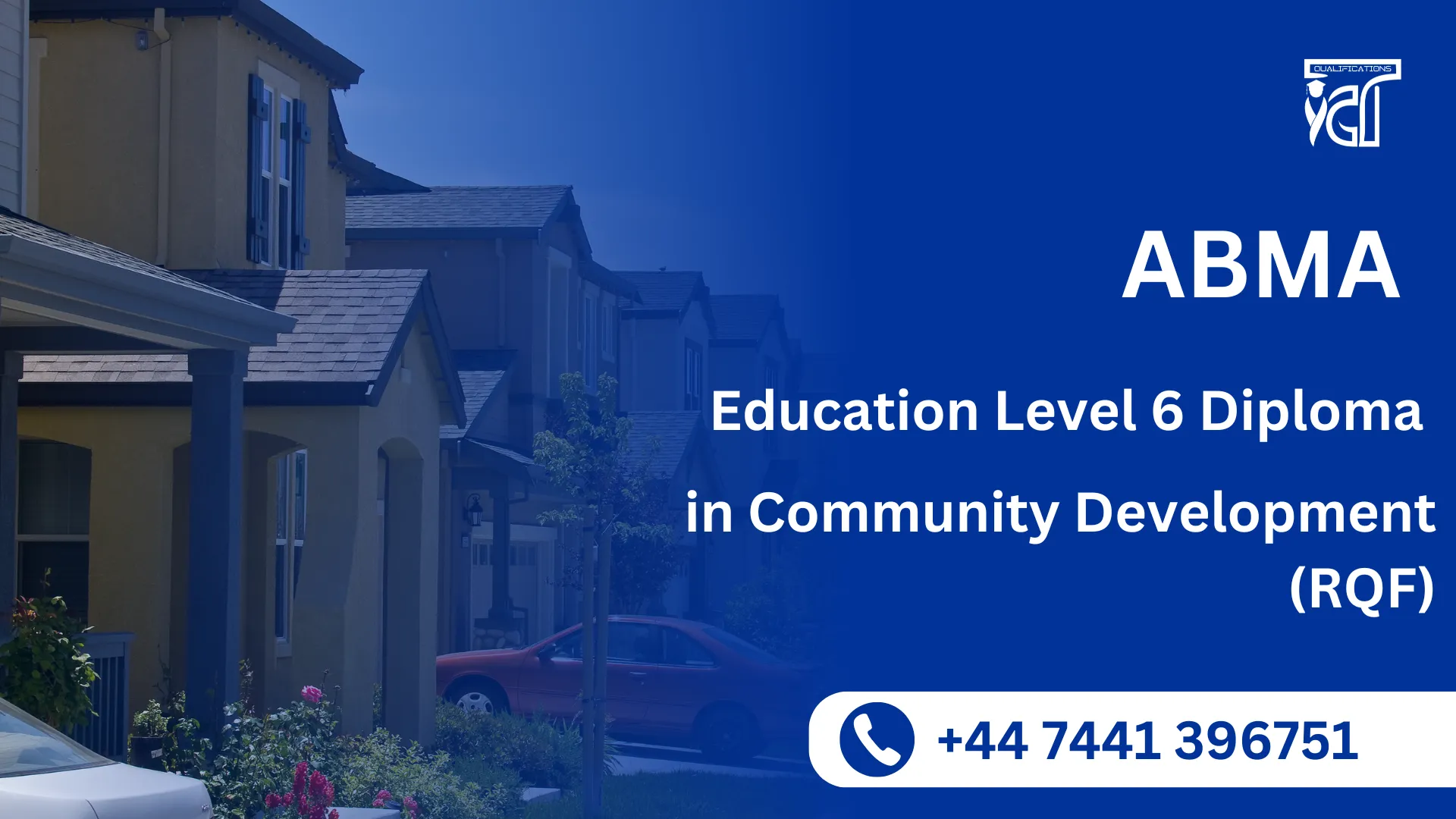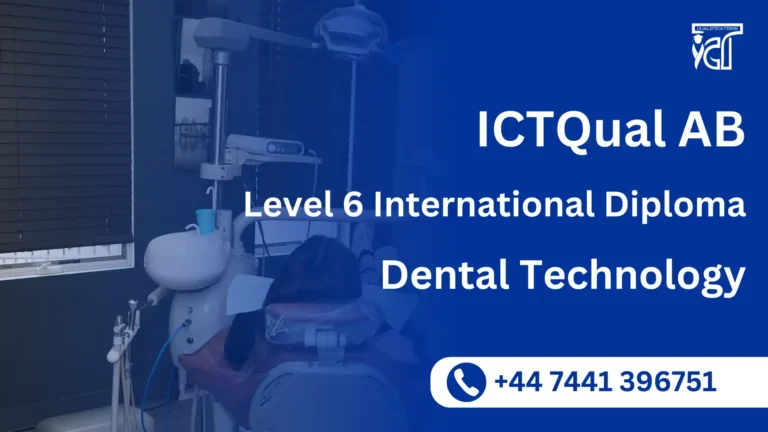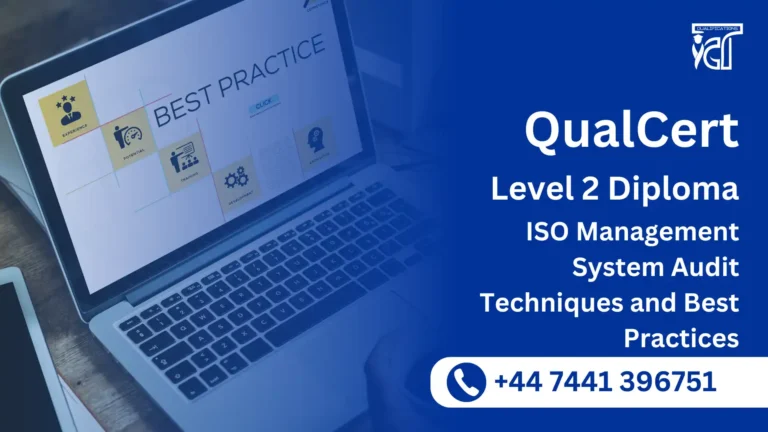The ABMA Education Level 6 Diploma in Community Development (RQF) is a prestigious Ofqual-regulated qualification designed for individuals who aspire to make a meaningful impact in their communities. This assignment-based course offers a comprehensive understanding of community development, equipping learners with the skills, knowledge, and practical tools required to lead and drive change in a variety of community settings.
This qualification provides an in-depth exploration of the social, economic, and political factors that affect community development, along with the strategies and interventions that can be employed to foster sustainable growth. With a flexible, assignment-based learning approach, the ABMA Education Level 6 Diploma in Community Development is ideal for those looking to progress in the field of community development or those wishing to transition into leadership roles in this growing sector.
The ABMA Education Level 6 Diploma in Community Development (RQF) is designed for individuals who want to advance their careers in community work, social services, or non-profit organizations. This qualification provides a blend of theoretical knowledge and practical skills, empowering students to create effective community programs and contribute to social justice and equality.
The ABMA Education Level 6 Diploma in Community Development (RQF) is a perfect choice for individuals who want to enhance their career in community development, social services, or non-profit management. This internationally recognized and Ofqual-regulated qualification provides essential knowledge and practical skills to become an effective leader in community development. Whether you are looking to progress in your career, take on a leadership role, or transition into a new field, this qualification serves as a powerful tool for success.
ABMA Education Level 6 Diploma in Community Development (RQF)
The ABMA Education Level 6 Diploma in Community Development (RQF), Leadership and Innovation qualification consists of 6 mandatory units of 120 credits, Total Qualification Time: 1200, and Total Guided Learning Hours: 480 for the completed qualification.
| Sr# | Unit Title | TQT | GLH | Credit |
|---|---|---|---|---|
| 1 | Critical Engagement with Social Policy | 240 | 96 | 24 |
| 2 | Leadership and Management in Community Development | 240 | 96 | 24 |
| 3 | Social Inequality, Change and Transformation | 240 | 96 | 24 |
| 4 | Reflective Practice | 240 | 96 | 24 |
| 5 | Project Management | 240 | 96 | 24 |
GLH (Guided Learning Hours) and TQT (Total Qualification Time) are terms commonly used in vocational qualifications to help define the amount of time a learner is expected to spend on their studies.
1. GLH (Guided Learning Hours)
GLH refers to the number of hours a learner spends being directly taught, supervised, or supported during their course. This includes the time spent in activities such as:
- Classroom instruction
- Practical workshops
- One-on-one tutoring or mentoring sessions
- Online learning sessions with tutor support
In other words, GLH represents the time that learners are actively engaged with their instructors or learning activities.
2. TQT (Total Qualification Time)
TQT represents the total amount of time a learner is expected to invest in completing a qualification, including:
- GLH (Guided Learning Hours): Time spent on direct learning, as explained above.
- Self-Directed Learning: This includes time spent on independent study, research, assignment completion, preparation for exams, and any other work the learner does outside of direct teaching hours.
TQT is a broader measure that includes all the time required to achieve the qualification. It helps learners and employers understand the overall commitment required for the qualification.
Key Differences Between GLH and TQT:
- GLH focuses on direct learning with guidance or supervision.
- TQT includes GLH as well as independent study time and other learning-related activities.
Example:
If a qualification has a TQT of 600 hours and a GLH of 250 hours, it means the learner should spend 250 hours in direct learning (classroom, online, or tutor-led sessions) and 350 hours on independent study or research.
Learning Outcomes for ABMA Education Level 6 Diploma in Community Development (RQF)
Upon completing the ABMA Education Level 6 Diploma in Community Development (RQF), learners will achieve the following learning outcomes based on the study units:
1. Critical Engagement with Social Policy
- Develop a deep understanding of social policy frameworks and critically analyze how policies impact community development. Evaluate the relationship between social policies, social justice, and inequality, and how they influence community initiatives and well-being. Apply critical thinking to assess the effectiveness of policy interventions and their role in shaping communities and societal change. Gain skills in policy analysis, allowing students to propose improvements in existing social policies to enhance community development outcomes.
2. Leadership and Management in Community Development
- Acquire leadership skills required to manage community development projects effectively, ensuring strategic planning, implementation, and evaluation. Understand management principles, including team leadership, resource allocation, and stakeholder engagement within community organizations. Develop key skills in decision-making and problem-solving to handle challenges and lead successful community development initiatives. Cultivate the ability to inspire, motivate, and empower teams while fostering a collaborative and inclusive work environment.
3. Social Inequality, Change, and Transformation
- Gain a comprehensive understanding of social inequality, its causes, and its impact on communities. Critically engage with theories of social change and transformation and how they can be applied to promote positive social outcomes in community development. Develop strategies to address inequality, marginalization, and disempowerment by using sustainable and innovative methods of social change. Understand the importance of social inclusion and equality in creating transformative and empowered communities.
4. Reflective Practice
- Engage in reflective practice to critically evaluate personal and professional experiences, helping to improve practice and understanding within the context of community development. Develop skills in self-assessment and continuous improvement, identifying personal strengths and areas for growth. Use reflective practice to enhance professional development, learning from experiences, and adapting approaches to community development. Understand how reflection can support the development of better community programs and initiatives.
5. Project Management
- Gain essential knowledge in project management methodologies, specifically designed for community development projects. Learn to plan, design, execute, and evaluate community projects, ensuring they are delivered on time, within budget, and with measurable impact. Develop skills in risk management, resource mobilization, and funding strategies for community-based projects. Understand how to set SMART goals (Specific, Measurable, Achievable, Relevant, Time-bound) and effectively manage project teams, timelines, and deliverables.
Benefits of the ABMA Education Level 6 Diploma in Community Development (RQF)
The ABMA Education Level 6 Diploma in Community Development (RQF) is a comprehensive qualification designed for those looking to advance their career in community development and social work. Here are the key benefits of pursuing this qualification:
1. Ofqual Regulated and Globally Recognized
- This diploma is Ofqual regulated, meaning it meets high academic standards and is recognized by employers and educational institutions both in the UK and internationally. Completing this course will give you a qualification that holds value across the globe.
2. Career Advancement Opportunities
- The Level 6 Diploma in Community Development prepares you for senior roles within the community development sector. By completing this course, you gain the skills needed for managerial or leadership positions in various community-based organizations, non-profits, and social enterprises, leading to greater career progression.
3. Comprehensive Knowledge and Skills
- The course equips you with in-depth knowledge of key topics in community development, including policy and practice, project management, and socio-economic development. This ensures that you are well-prepared to take on the complexities of managing and leading community-based initiatives.
4. Flexible Learning (Assignment-Based)
- This qualification is assignment-based, offering flexibility for students to learn at their own pace. Whether you’re a working professional, caregiver, or anyone with time constraints, this flexible approach allows you to balance your studies with other commitments.
5. Enhances Employability
- With a Level 6 Diploma in Community Development, you will stand out to employers in the social sector. The diploma demonstrates your advanced understanding and commitment to improving communities, making you a strong candidate for roles such as community project manager, social services manager, and other senior positions in the sector.
6. Real-World Application
- The ABMA Level 6 Diploma focuses on practical application and real-world case studies. You will learn to tackle real challenges faced by communities, equipping you with the necessary problem-solving, leadership, and strategic planning skills to make a positive impact.
7. Pathway to Further Education
- This diploma can be a stepping stone to further academic qualifications. Graduates can progress to a Master’s degree in areas such as Social Work, Public Administration, or Development Studies, allowing for even more specialization and career opportunities.
8. Increased Social Impact
- Community development professionals are often at the forefront of addressing social inequalities, improving community cohesion, and enhancing local well-being. With this qualification, you gain the expertise to drive positive change in communities, helping to address issues such as poverty, education, health, and housing.
9. Networking Opportunities
- Throughout the course, you’ll be exposed to a range of community development strategies, global best practices, and experienced professionals in the field. This exposure creates valuable opportunities for networking, collaboration, and professional growth within the community development sector.
10. Prepare for Diverse Roles in Community Development
Upon completion of this course, you will be prepared for a wide variety of roles, from community outreach coordinator to policy advisor and project leader. The diverse skill set you develop will allow you to work in a range of settings, including government agencies, NGOs, international development organizations, and social services.
Best Fit for the ABMA Education Level 6 Diploma in Community Development (RQF)
The ABMA Education Level 6 Diploma in Community Development (RQF) is ideally suited for individuals who are passionate about creating positive social change and improving the well-being of communities. The following groups would benefit most from this course:
1. Aspiring Community Development Professionals
- If you are looking to enter the field of community development and wish to gain advanced knowledge and practical skills, this qualification is a perfect starting point. It provides the comprehensive foundation needed for roles in community-focused organizations, non-profits, and social enterprises.
2. Current Community Workers Looking to Advance Their Careers
- Professionals already working in community development, social work, or related fields who want to enhance their qualifications and progress to senior roles, such as community project managers, development coordinators, or policy advisors, will find this course highly beneficial.
3. Social Services and Public Sector Employees
- Individuals working within the public sector or social services who want to gain a deeper understanding of community development practices and policies will be well-equipped for leadership roles with this qualification. This includes roles in local government, public health, education, housing, and more.
4. Non-Profit and NGO Workers
- For those working in non-governmental organizations (NGOs) or charity organizations, this diploma will enhance your ability to manage community-based projects, improve service delivery, and contribute to the overall strategic planning and policy development of your organization.
5. Social Entrepreneurs
- If you are an entrepreneur with a passion for social change and want to launch your own community-focused business or organization, this course provides the necessary skills in project management, community engagement, and socio-economic development to turn your vision into reality.
6. Professionals in Education, Public Health, or Welfare
- Individuals working in education, healthcare, or social welfare, who wish to expand their skill set in community development and engage in cross-sector collaboration, will find this qualification a valuable addition to their professional development.
7. International Development Enthusiasts
- Those who aspire to work in international development or with global organizations addressing poverty, inequality, and social development will benefit from this diploma. It provides the theoretical and practical knowledge to work on large-scale community development projects worldwide.
8. People Interested in Policy and Advocacy
- If you are interested in shaping policies that affect local communities or advocating for change at higher levels of governance, this qualification provides you with the tools to understand community dynamics and craft policies that have a real impact on society.
9. Individuals Interested in Social Justice and Equity
This course is perfect for those who are driven by a strong sense of social justice and want to work towards reducing inequalities, improving access to resources, and ensuring that marginalized communities have a voice in decision-making processes.
Entry Requirements
Register Now
Qualification Process
Qualification Process for the ABMA Education Level 6 Diploma in Community Development (RQF)
- Self-Assessment:
Begin by evaluating your eligibility to ensure you meet the qualification requirements, including work experience, knowledge, and language proficiency. - Registration:
Complete your registration by submitting the required documents, including a scanned copy of a valid ID, and paying the registration fee. - Induction:
An assessor will conduct an induction to confirm your eligibility for the course and explain the evidence requirements. If you do not meet the criteria, your registration will be canceled, and the fee will be refunded. - Assignmnets & Evidence Submission:
Provide all assignmnets and the necessary evidence based on the assessment criteria outlined in the course. If you are unsure of the required evidence, consult with the assessor for guidance on the type and nature of evidence needed. - Feedback and Revision:
The assessor will review your submitted evidence and provide feedback. Evidence that meets the criteria will be marked as “Criteria Met,” while any gaps will be identified. You will be asked to revise and resubmit if needed. - Competence Evidence:
Submit final evidence demonstrating that all learning outcomes have been met. This evidence will be marked as “Criteria Met” by the assessor once it is satisfactory. - Internal Quality Assurance (IQA):
The Internal Quality Assurance Verifier (IQA) will review your evidence to ensure consistency, quality, and compliance with standards. - External Verification:
The IQA will submit your portfolio to ABMA External Quality Assurance Verifiers (EQA) for final confirmation. The EQA may contact you directly to verify the authenticity of your evidence. - Certification:
Upon successful completion of all checks, ABMA will issue your official certificate, confirming that you have attained the ABMA Education Level 6 Diploma in Community Development (RQF).







